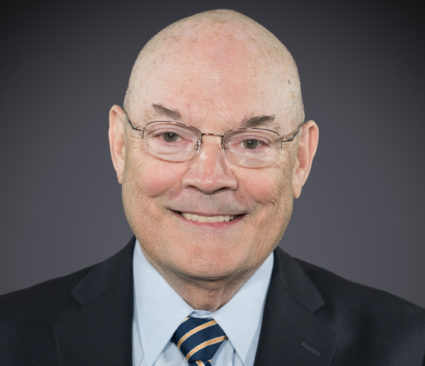
“What happens to your Social Security payments when one spouse dies?”
Making Sense (PBS News Hour)
by Philip Moeller
July 12, 2018
Editor’s Note: Journalist Philip Moeller is here to provide the answers you need on aging and retirement. His weekly column, “Ask Phil,” aims to help older Americans and their families by answering their health care and financial questions. Phil is the author of “Get What’s Yours for Medicare,” and co-author of “Get What’s Yours: The Revised Secrets to Maxing Out Your Social Security.” Send your questions to Phil; and he will answer as many as he can.
Christine: I have searched the Internet and found no answer to my dad’s problem. Mom just died, at 74. She earned $1,400 a month in Social Security. Dad is 74 and gets $1,200 a month. This was their only income and it barely covered their expenses. They have no savings.
Now Social Security has told my dad that he will get only $1,400 a month and that his benefit would stop! That is just not enough to live on. I can’t believe our government does this to the elderly! Is there something more we need to know? Is there a way to get both? Now, besides losing his wife of 50 years, he will be in debt for the first time. Is there anything he can do?
Phil Moeller: Sadly, these are the rules. When one spouse dies, the lower Social Security payment goes away. I can cite you all sorts of reasons why this is the case, and even why it is “fair,” but they won’t alter the unpleasant surprise faced by your dad and many other surviving spouses.
With the first baby boomers now age 72, the volume of these very difficult survivor situations will be increasing sharply.
PBS News Hour, Philip Moeller
When Social Security was created in 1935, very few women were in the workforce. The man’s benefit was the dominant source of retirement income, so family benefits did not drop off sharply when one spouse died. With the percentage of women in the labor force now about equal to men, this is no longer the case. And with the first baby boomers now age 72, the volume of these very difficult survivor situations will be increasing sharply.
Among the many, many proposals to change Social Security is one that would provide surviving spouses higher benefits – say 75 percent of what both spouses had been receiving. This would help Christine’s dad a great deal but, of course, creating such a benefit also would increase Social Security spending.
Assuming that Democrats and Republicans might someday be willing to sit down together and consider badly needed Social Security reforms, they need to devise ways to pay for them. Social Security is projected to run short of funds by 2034, and perhaps sooner, and would be able then to pay only 75 percent of the benefits that people have been promised.
Historically, Social Security has always been a self-supported benefit that was entirely funded by payroll taxes. This has been one of its greatest strengths, allowing it independence from the kinds of government logjams that regularly tie other programs in knots.
To maintain this independence, the program will have to get congressional approval for a combination of higher payroll taxes from some or all wage earnings, some program cuts, and also some increases in benefits, such as raising payments to surviving spouses. Getting Congress to agree on such a package is not feasible now, and fashioning a solution will only get harder.
Growing numbers of older beneficiaries are already boosting federal spending on health care and Social Security, further adding to federal deficits. Recent Republican tax cuts and spending agreements have greatly worsened those deficits, while stimulating an already strong economy and leading to higher interest rates. You do the math.
Stephen – Mass.: I will soon turn 65 and plan to get Medicare. My wife also will turn 65 but she has been a government employee and only has 38 quarters of work during which she paid Social Security payroll taxes. We just called Social Security and were told that she does not qualify for Medicare on her own but would qualify under my Social Security record. Is this true? Is there any difference in her being accepted under her own record and mine?
Phil Moeller: She doesn’t need 40 quarters to qualify for Medicare but she does need 40 to get premium-free Part A. Otherwise, it costs a bundle. Fortunately, she does qualify as your spouse, and will be treated no differently than if she had qualified on her own earnings record.
Peggy – Texas: Can I cancel my Medicare? I am getting miserable health care and feel my money is just being wasted on the insurance company I am using and the doctors that treat me. I feel like I am wasting my money when I get referred to a specialist, nothing actually is done, and I am still in a lot of pain. I don’t think the doctors want to treat HMO patients and the patient does not get the same quality care as others do with better insurance. I want to get back the $134 they are taking out of my Social Security each month. Can I do this?
Look for a better Medicare insurance plan during this fall’s Medicare open enrollment period, and then switch to that plan for [insert year].
PBS News Hour, Philip Moeller
My suggestion is that you look for a better Medicare insurance plan during this fall’s Medicare open enrollment period, and then switch to that plan for [insert year]. For example, if you dropped your current plan, you could get another Medicare Advantage plan. You also could drop MA entirely and use just basic Medicare. It will cover you at any doctor who accepts Medicare.
Basic Medicare, however, doesn’t cover everything that some MA plans cover, and also can be expensive. Some people with basic Medicare also get a Medigap supplemental plan. And you’d still need drug coverage.
Ora – N.Y.: My aunt has been hospitalized for a while and is now in rehabilitation. Her social service worker said that she can drop her Medicare insurance and get on Medicaid for a few months while she is recuperating. Is this even possible?
Phil Moeller: Medicaid pays for Medicare for low-income Medicare beneficiaries. So, it’s not really a matter of dropping Medicare in favor of Medicaid. The issue is whether your aunt qualifies for Medicaid assistance in paying for her Medicare. This depends on New York Medicaid rules. The State Health Insurance Assistance Program (SHIP) provides free counseling; I suggest you contact a local office and see if someone there can help you.

Original Article of PBS.org News Hour’s Philip Moeller Re-Posted Here by SAF StabilityAndFamily
Phil Moeller is the author of “Get What’s Yours for Medicare: Maximize Your Coverage, Minimize Your Costs” and the co-author of the updated edition of The New York Times bestseller “How to Get What’s Yours: The Revised Secrets to Maxing Out Your Social Security,” with Making Sen$e’s Paul Solman and Larry Kotlikoff. On Twitter @PhilMoeller or via e-mail: medicarephil@gmail.com.



